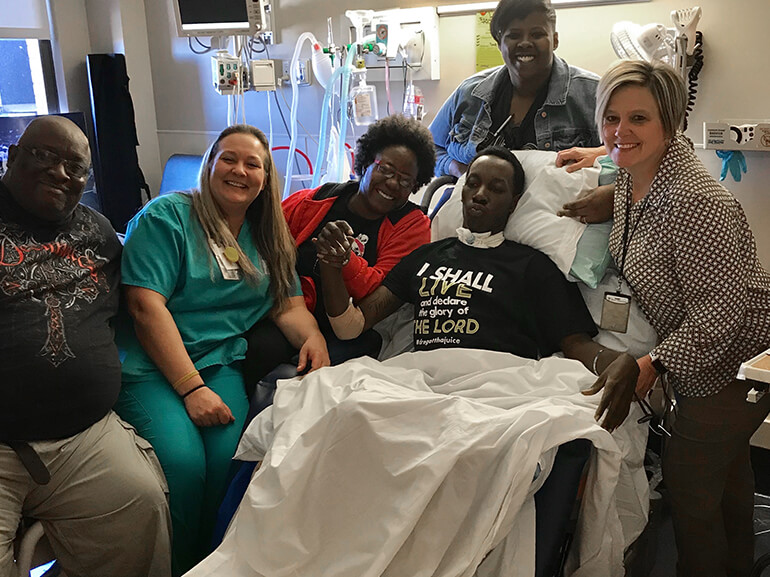DeAndre's Story

Helping an aspiring rapper rediscover his voice
On October 17, 2019, 19-year-old DeAndre Laster's life changed in an instant. He was accidentally shot in the chest, rushed to the emergency room and straight to surgery. Surgeons discovered the bullet pierced his lung, heart and spinal cord. He lost nearly all his blood, and his heart stopped. Surgeons massaged it for 10 minutes as transfusions took effect. In all, his heart stopped at least seven times.
DeAndre lived through the night, but further testing revealed he suffered a brain injury from lack of oxygen. His condition was compounded by a spinal cord injury that left him paralyzed below the waist. His parents were told to prepare for the worst.
Not ready to give up, they moved DeAndre to Regency Hospital Greenville for its experience in caring for medically complex patients.
He arrived unable to breathe, eat, speak or move on his own. He'd been sedated to allow his body to heal. He was also on a high dose of anti-seizure medication, which made him sleepy and unable to follow basic commands.
A physician-led team of nurses, therapists, pharmacists and dietitians created a plan to put life and music back into DeAndre.
Respiratory therapists knew consistency would be key to his success. They tested reducing the machine’s settings, encouraging his lungs to do more work. There were days when liberation seemed imminent and he was almost breathing on his own. There were others where he slid back, requiring full support. His parents and girlfriend stayed with him through it all. Their number one goal, they said, was to get him off the ventilator and breathing independently.
As the days progressed, pharmacists and doctors reduced sedatives. DeAndre became more alert and started following commands. It was a turning point because his mother had been told this might never happen.
DeAndre’s family said physical and occupational therapists played a huge part in his healing journey. Twice a day, even when he was on the ventilator, therapists moved him to a special recliner. Sitting up in a chair promotes lung expansion and helps patients with ventilator weaning. Physical and occupational therapists performed passive range of motion exercises while DeAndre lay in bed; moving his arms, legs, feet, ankles, wrists and hands, then teaching his family to do the same.
The respiratory team kept working, patiently moving through breathing and coughing exercises as they inched toward liberation. It took almost a month, but DeAndre got there and began breathing independently.
It was time to tackle his second goal - eating regular meals. Once he was off the breathing machine, speech therapists assessed DeAndre’s ability to swallow safely. He began with pureed foods, such as mashed potatoes and apple sauce. Speech and nutrition collaborated to slowly introduce thicker foods until DeAndre successfully ate a regular meal and drank thin liquids.
Physical therapy moved on to DeAndre's next goal, helping him build trunk strength through a variety of exercises, including sitting on the side of the bed. Occupational therapists worked with him on grip, upper body movements and hand-eye coordination.
Because music and rapping were DeAndre’s twin passions, staff incorporated that into daily care. Music was often playing in his room as he worked hard to rap lyrics. Singing and rapping blended numerous therapies, including speech and respiratory. He told one of his certified nursing assistants, "I will rap again one day."
In one month, the young man given slim survival odds was ready for the next step in in recovery. Now able to breathe and move on his own, DeAndre spent time in an inpatient rehabilitation center, where he received ongoing physical and occupational therapy to continue building strength.